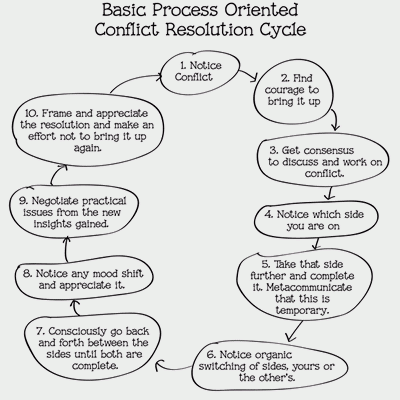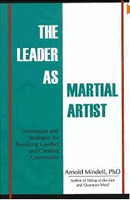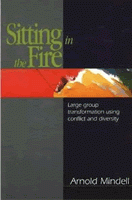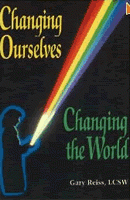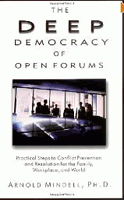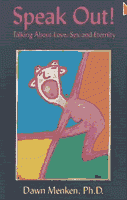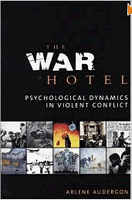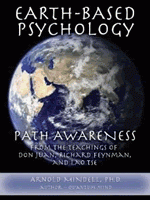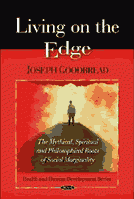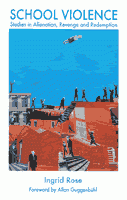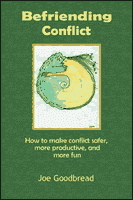Worldwork (WW) was developed by Dr. Arnold Mindell, founder of Process Oriented Psychology or Process Work and colleagues. Worldwork is both an experiential training seminar that takes place usually every 2 years and is also a small and large group Process Work method/philosophy as explained below.
“Deep Democracy is our sense that the world is here to help us to become our entire selves, and that we are here to help the world to become whole.” Arnold Mindell
Worldwork is an experiential training seminar in conflict work and community building. The seminar provides a unique opportunity for people from all over the world to come together in a powerful forum for focusing on and working with social, environmental, and political issues using group process skills. Between two and three hundred people from over thirty countries participate in these 6 day gatherings. The large staff team facilitates a diversity of learning experiences that include large group focus and interaction, small group meetings, one-to-one sessions and networking groups.
“Deep Democracy is the principle behind a community building process that hears all voices and roles, including our collective experiences of altered states, and subtle feelings and tendencies. It is a principle that makes space for the separable, the barely speakable and the unspeakable.” Arnold Mindell
Worldwork is a small and large group Process Work method that uses Deep Democracy to address the issues of groups and organizations of all kinds. To resolve reality problems and enrich community experience, Worldwork methods focus on finding and employing the power of an organization’s or city’s dreamlike background (e.g. projections, gossip, roles, and creative fantasy). Worldwork facilitators listen to the land, do innerwork, practise outer communication skills involving role consciousness, signal and rank awareness to enrich organizational life. Worldwork has been successfully applied to the analysis of, and work with multicultural and multileveled groups, Aboriginal communities, universities, small and large international organizations, city hot spots, in corporations and world conflict zones. (adapted from www.aamindell.net )
WorldWork Events
Large, international WorldWork seminars are held roughly every other year in a different country. Local WorldWork events are held regularly in various locations around the world. Check with the regional centers or individual facilitators for more information. The next large WorldWork seminar will be held in Denver, Colorado, USA: April 13-19, 2011.
See www.worldwork.org for more information:
In 1991, the Global Process Institute was formed to promote a series of training and research seminars known as the Worldwork Seminars. These have been held approximately every one or two years since 1991.
Typically these 6-10 day events have been attended by between 200-300 people from over 40 countries, all coming to learn more about facilitating conflict and creating community. Each worldwork seminar has a distinct flavor created by the location of the event and the participants who attend.
Former Worldwork Seminars include:
|
Origins
The term “worldwork” was introduced by Arnold Mindell in his 1992 book, “The Leader as Martial Artist” as: “a method that helps small and large groups live, work and grow together in their environments.”[2]
Worldwork emerged from Mindell’s realization that “psychology” was too limiting a framework for understanding our experience of ourselves, one another, social problems and the world, and needed to be replaced by a more encompassing field-like concept that took into account the interactions among individuals, groups, and the environment in which they are situated (Mindell, 1992)
A crucial step in the transition from process work with individuals to worldwork was outlined in Mindell’s earlier book, “The Year 1: Global Process Work” (Mindell 1989). There, Mindell presented a theory of and methods for working with group process: the collective counterpart of process work with individuals.
Basic Ideas
While deep democracy forms its philosophical background, worldwork is based on the systemic process oriented field theory of group process.[3] Group process is a generalization of process work concepts to groups.[4] Process work conceptualizes the individual as having a set of experiences with which he or she identifies – the “primary process,” as well as experiences which are marginalized, projected, or repressed – “secondary processes”. Secondary process experiences are marginalized because they challenge the individual’s identity. To embrace a secondary process experience requires going over an “edge” – the set of rules, fears, and uncertainties that on the one hand define, and on the other hand limit our sense of personal identity. Secondary processes do not stay marginal, but intrude on the individual’s identity in the form of physical symptoms, troublesome relationships, and disturbing collective or world events that ultimately transform the person’s identity, with unpleasant or even disastrous consequences. Process work sees these disturbances as meaningful information or messages that, when unfolded with curiosity and respect, can enhance and expand the person’s identity in unexpected ways.
A group has a primary process or identity – the mission or circumstances that bring it together, and to which most of its members consent. That identity can be challenged from within the group, by individual members who disagree with the group’s prevailing identity, and from without, by other individuals or groups who challenge the group’s integrity.
Internal and external disturbances are the secondary processes of the group. They manifest as dissent and conflict that, if unprocessed, may split the group or result in the exclusion of the disturbing individuals. As in the case of an individual, if the group can view the challenge to its identity as meaningful, the disturbance can be integrated to the benefit of the group, rather than leading to its destruction. A group’s primary and secondary processes form a “field” in which various dissenting viewpoints become polarized, sometimes leading to a tense and conflictual atmosphere. Individual members of the group become strongly identified with these viewpoints. Should the majority of the group members reject a dissenting viewpoint, the individuals who hold that viewpoint are also rejected.
The principle of deep democracy values all viewpoints in a group. This principle recognizes the importance of secondary processes of all sorts including, but not limited to dissent, hopeful dreams, and deepest beliefs. It is up to the facilitator of the group process to make space for these viewpoints to emerge and interact. The complexities of this facilitation process are the basic skills of worldwork. It is important to understand that the diverse viewpoints represented in a group are not necessarily bound to the individuals that hold them at a particular moment. Rather, they are “roles” that can be occupied by any individual in the group. Good facilitation enables individuals to experiment with switching roles, so as to be able to better understand one another’s viewpoints.
Facilitation
A facilitator of a group process is a person who consents to maintaining a neutral or “meta” position – to act as the “organ of awareness” of the group. Facilitation is a role that can be passed among group members, or that can be occupied by several individuals at the same time. In practice, group processes are conducted by identified facilitators; group members who act in a facilitative manner act as “participant-facilitators”.
It is the facilitator’s task to keep an overview of the dynamics of the group process and to report these back to the group. In this way, the facilitator helps the group to reflect on its own experience and behavior, and helps the group process to unfold and complete itself.
Worldwork facilitation requires an experiential and self-reflective training that focuses on the facilitator’s development and on learning to maintain a centered mind in the midst of conflict, volatility, unpredictable behavior, and emotionality. It also requires an understanding of how one’s own rank – power and privilege – influences facilitation by filtering perceptions, creating biases and assumptions, and limiting our awareness of how rank is reflected in subtle communication cues and ways of speaking.
Applications
The basic elements of worldwork – deep democracy and group process – find broad application in the areas of group facilitation, community development, conflict resolution and organizational development.
Besides the large “Worldwork Seminars” organized by the Global Process Institute and described below, individual practitioners conduct regional seminars that focus on specific issues. Such seminars have been held in various “hot spots” throughout the world, working on issues such as apartheid in South Africa, Israeli-Palestinian issues in the Middle East, the Northern Irish troubles, Turkish and Greek Cypriot tensions, and racial tensions in the United States. The goal of these seminars is to promote dialog among conflicting parties without imposing artificial rules that unconsciously bias communication and interactional styles to favor one or another side of the conflict.
Another area of application is the so-called “open forum” devised by Mindell to provide a venue for processing “hot” regional issues in a form that respects the emotional limits of the participants without marginalizing any of their viewpoints. Mindell published the theory and methodology of open forum in his book, “The Deep Democracy of Open Forums” (Mindell, 2002).
Finally, worldwork principles have found application in coaching, organizational development, leadership training, and government where they offer methods of understanding the significance of challenges to organizational integrity as potential avenues of growth, rather than as disturbances against which the organization must defend itself.
Worldwork & Conflict Transformation Books
The Leader as Martial Artist
Arnold Mindell
1992
A groundbreaking examination of conflict resolution and leadership. The Leader as Martial Artist shows how confronting the challenges of today’s world requires the skill of a martial artist: a leader who exhibits flexibility, balance, detachment, intensity, sure instinct, and keen awareness in the midst of group chaos and confusion.
For readers interested in conflict resolution and organizational dynamics, Leader as Martial Artist is a great place to start.
Mindell, A. (1992). The Leader as Martial Artist: An Introduction to Deep Democracy (1st ed.). San Francisco: Harper San Francisco.
Available in Portuguese:
Sitting in the Fire
Arnold Mindell
1995
Using examples ranging from disputes in small organizations to large-scale conflicts in countries around the world, Sitting in the Fire offers practical methods for working with conflict, leadership crises, stagnation, abuse, terrorism, violence, and other social action issues. It brings an understanding of the psychology of conflict and the knowledge that many disputes can be traced back to inequalities of rank and power between parties, providing tools that will enable people to use conflict to build community.
Mindell, A. (1995). Sitting in the Fire: Large Group Transformation using Conflict and Diversity (1st ed.). Portland, Or.: Lao Tse Press.
Changing Ourselves, Changin the World
Gary Reiss
2000
Most people feel disturbed by the political and social problems we see every day yet, at the same time, feel helpless to solve them. We feel even more disturbed as we and others give up our personal power in futile attempts to solve these problems. We have given our power away to politicians and others who accomplish little or nothing as they serve their own narrow interests. People have become apathetic because the world situation is just too overwhelming. This book will help you to view the world situation in a way that is not overwhelming. It provides ways for you to take back your power for personal growth and social change.
Reiss, G. (2000). Changing Ourselves, Changing the World.
The Deep Democracy of Open Forums: Practical Steps to Conflict Prevention and Resolution for the Family, Workplace, and World
Arnold Mindell
2001
Most of us are terrified of conflict, says Arnold Mindell, PhD, author of fifteen books and internationally recognized for his innovative synthesis of Jungian therapy, dreams, and bodywork. But we needn’t be. His burning passion is to create groups and organizations where everyone looks forward to group processes instead of fearing them. He calls this the deep democracy of open forums, where all voices, thoughts, and feelings are aired freely, especially the ones nobody wants to hear.
Since 1992, one of Mindell’s prime interests has been the bringing of deeper awareness to group conflicts. Conflict work without reference to altered states of consciousness is like a flu shot for someone in a manic or depressed state of consciousness. Most group and social problems cannot be well facilitated or resolved without access to the dreamlike and mystical atmosphere in the background. The key is becoming aware of it.
Mindell introduces a new paradigm for working in groups, from 3 to 3,000, based on awareness of the flow of signals and events. You can take the subtlest of signals indicating the onset of emotions such as fear, anger, hopelessness, and other altered states, and use them to transform seemingly impossible problems into uplifting community experiences. As Mindell explains, “I share how everyone—people in schools and organizations, communities and governments—can use inner experiences, dreaming, and mysticism, in conjunction with real methods of conflict management, to produce lively, more sustainable, conscious communities.”
Mindell, A. (2002). The Deep Democracy of Open Forums. Charlottesville, VA: Hampton Roads.
Speak Out! Talking About Love, Sex & Eternity
Dawn Menken
2002
With humor, grace, and keen vision, Speak Out! shows how the diverse members of our modern world can learn to appreciate one another by following the mysterious spirit of life. Dr. Menken demonstrates how we can move beyond simple tolerance into a joyous celebration of the unique beauty of all perspectives. Speak Out! explores the relationship between the mainstream and marginalized groups, the nature of love, the spirit of relationship, and the making of true community. Sometimes irreverent, often poignant, always insightful.
Her insightful awareness into the important issues of today make this book a must for all readers. — Amy Mindell, Ph.D., author of Metaskills
Takes the art of consciousness-raising to a new level: our most intimate personal experiences can be doorways to eternity. — Sara Halprin, Ph.D., author of Look at My Ugly Face!
With skill and compassion she deals with the difficult subject of marginalization and the conflicts it engenders. — Dr. Joseph Goodbread, author of Radical Intercourse
Menken, D. (2002). Speak Out! Talking About Love, Sex & Eternity. Tempe, AZ: New Falcon Publications.
The War Hotel: Psychological Dynamics in Violent Conflict
Arlene Audergon
2005
Human Nature is the fuel of violent conflict. The War Hotel looks at how we get aroused and how we get silenced into violent conflict. We are pulled apart in the name of justice and loyalty. Past trauma is triggered into a replay. Out of love and longing to step beyond the ordinary world, we sacrifice ourselves and others. Dehumanizing the enemy, disinformation, torture, stirring fear in order to crack down – these terror tactics, too, are based in psychology. The manipulation of psychological dynamics to create violent conflict is distressing. But, if our emotions and behaviour are the fuel, then our awareness can impact world events. There is something truly hopeful here. Awareness makes a difference. (Examples draw particularly from the author’s work in the Balkans. Other examples include Nazi Germany, Rwanda, the Israeli–Palestinian conflict, Communism and its fall in Europe, South Africa, the treatment of Native Americans and African Americans in the USA, Vietnam and the ‘war on terror’. )
in War Hotel, Arlene introduces a Chart of Symptoms of PTSD in Individuals and Signs of Communal and Collective Trauma, formally presenting the connection between PTSD symptoms in individuals, group, communities, and traumatized societies. .
The War Hotel is also available in Croatian and Russian. See Interview (in Croatian) with ZAMIR magazine.
The War Hotel is an ambitious, fascinating exploration of the psychology of conflict, from American street gangs to bloodshed in the Balkans. With Arlene Audergon as guide, the reader takes an enlightening journey to the hidden underside of modern war, and finds a ray of hope that humankind can, indeed, ‘break free from the nightmare’. (Charles J. Hanley, Pulitzer Prize-winning Associated Press special correspondent, with 30 years of experience covering war zones and co-author of The Bridge at No Gun Ri; A Hidden Nightmare from the Korean War.)
From her rich personal experience working in conflict areas, Arlene Audergon not only describes the inner and outer nature of war, but the personal and community developments we must make to find relief, resolution and a wise center in the midst of it all. (Dr. Arnold Mindell, international conflict facilitator, author of The Deep Democracy of Open Forums and Sitting in the Fire)
This absorbing, inspiring work combines the experience of working in war torn circumstances, cultural sensitivity and Process Work theory.The ‘War Hotel’ reveals the hidden terror of violent conflict, and offers a revitalizing perspective – that spoke directly to my experience and work with the processes creating so much violence here in DC, and for these turbulent times. (John L. Johnson, Ed.D Professor Emeritus, University of the District of Columbia)
With its passion, wisdom and care, The War Hotel means making sense of my own experience of war. Yes, we lived through it, suffered and most of us felt it was just ‘happening to us’. Reading this book puts in a frame the confusing and painful experiences in a way we can actually look at it and learn from it – and feel a part of the great jigsaw puzzle of human beings on earth. (Tanja Radocaj, Zagreb, Head of UNICEF Office, Croatia.
Audergon, A., Ph.D. (2005). The War Hotel: Psychological Dynamics in Violent Conflict. London: Whurr.
Book Review: Europe’s Journal of Psychology
Also: See Arlene’s related article:
Audergon, Arlene: Collective Trauma: The Nightmare of History, Psychotherapy and Politics International, Volume 2, Number 1, 2004, Whurr Publishers Ltd London
Earth-Based Psychology: Path Awareness from the Teachings of Don Juan, Richard Feynman, and Lao Tse
Arnold Mindell
2007
Drawing liberally from physics, psychology, aboriginal beliefs, and shamanism, this spiritual guide defines, explores, and applies both earth-based psychology and the related idea of path awareness—the innate ability to sense where to turn at a given moment.
By drawing together disparate elements of contemporary science and ancient wisdom, it is shown here that new methods emerge of determining the best direction through inner turmoil, relationship trouble, team and community issues, and world issues. Jung’s work is taken further and linked with diverse disciplines and wisdom traditions, making scientific ideas accessible to nontechnical readers. Theory and experiential exercises are presented in a simple, imaginative manner, with diagrams and illustrations to strengthen lessons for readers.
Mindell, A. (2007). Earth-Based Psychology: Path Awareness from the Teachings of Don Juan, Richard Feynman, and Lao Tse. Portland, OR: Lao Tse Press.
Living on the Edge: The Mythical, Spiritual, and Philosophical Roots of Social Marginality
Joseph Goodbread
2009
This book starts by seeking to answer the question, ‘Why do the people who fight our wars and clean up our natural and self-made disasters wind up on the margins of society?’ Based on the author’s work with a group of Chernobyl liquidators – members of the army of more than 750,000 who decontaminated and sealed the site of the 1986 nuclear reactor disaster – the book explores the processes that lead those who start off as heroes to be ultimately despised and rejected by the very society they rescued. A key to this mystery is found in the ancient Chinese creation myth of Pan Ku, in which the universe is created from the fragmentation of the body of an immense primal being, while human beings are created from the vermin on its body- the very essence of a marginal existence. The journey leads us through an exploration of experiential philosophy, mythology, linguistics, and psychology to the very roots of reality itself. “Living on the Edge” then applies this model of social marginalisation to understanding the why and how the mentally ill are marginalised, shedding light on why, once we are at the margins, return to mainstream society is so difficult. The book concludes with some suggestions about how to make marginalisation more of a process and less of a fixed state through the arts and mass media.
Goodbread, J., Ph.D. (2009). Living on the Edge: The Mythical, Spiritual, and Philosophical Roots of Social Marginality New York: Nova Science Publishers.
School Violence
Ingrid Rose
2009
Experiences of violence in school are encountered much more frequently than they used to be. The shocking repercussions of these acts are felt nationwide and particularly impact school populations, families, and communities. This book undertakes to illuminate factors pertaining to the phenomenon of school violence. What makes this book particularly interesting is its depth-oriented view into behavioural and systemic dynamics, arely explored before in this context.
In exploring the inner worlds of disturbed students, the aim of this book is twofold. One important aspect is to bring enhanced understanding of dynamics involved in incidents of school violence to professionals, family members, school staff, and the larger social system. The other facet ot this book focuses on the initroduction of tools and techniques that can be used to bring ou the inner experiences of students that usually remain unspoken and unaddressed. In utilizing dream figures, myth, image, body awareness, and group dialogue, previously ignored or repressed phenomena can find a place in which they can be contained and acknowledged.
School Violence is a vital, timately contribution. Dr Rose recognizes that chronic denial of the daimonic is at least as dangerous in adolescence as adulthood. She skillfully applies the penetrating insights of depth psychology to decipher the deepening epidemic of anger, rage, and violence in our schools. This book courageously honors the therapeutic power, wisdom, and value in acknowledging and constructively expressing the daimonic or shadow orather than destructively repressing and demonizing it. –Dr Stephen Diamond, author of Anger, Madness, and the Daimonic
In this helpful new book on school violence, Dr Ingrid Rose brings us theories and new practical methods for understanding and dealing with alienation, revenge, and the place of student conflicts in the larger educational and social systems. –Dr Arnold Mindell, author of Sitting in the Fire
Befriending Conflict
Joseph Goodbread
2010
Befriending conflict – what an idea! Among the hundreds of people author Joe Goodbread has helped with conflicts ranging from everyday family and neighborly disputes, to the Troubles in Northern Ireland, most would rather avoid conflict completely, than risk the emotional pain, potential violence, and loss of personal power that they associate with conflict. But each year, more and more people are finding that conflict can be fun! Using the simple methods of Befriending Conflict, you, too, can enjoy the buzz of productive and humane conflict, deepening your most important relationships while minimizing the risk of escalation and loss. Befriending Conflict is a concise, “how to” book that gives you easy steps for recycling conflict into personal growth, sustainable relationships, and self-empowerment. Befriending Conflict fills a growing need for guidance in dealing with emotions and other disturbing states of mind in all aspects of conflict facilitation and dispute resolution, a topic that is gaining increasing attention as the more technical aspects of conflict management mature. Befriending Conflict is the first book that shows how strong emotions and power, approached with curiosity and awareness, can enhance any conflict management method, in any venue. In addition to standing on its own as a guide to preparing for conflict, it can be used as an adjunct to any other work on conflict management. Befriending Conflict rests on age-old principles brought up to date and presented in the form of simple exercises, accessible to anyone with an interest in making conflict into more of an ally and less of a feared but unavoidable burden.
Goodbread, J., Ph.D. (2010). Befriending Conflict: How to make conflict safer, more productive, and more fun. Scotts Valley, CA: CreateSpace

